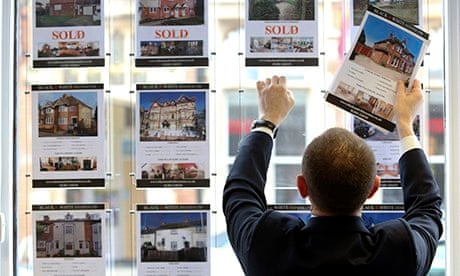House prices could rise by as much as 8% next year unless there is a flood of new properties on to the housing market, according to the property website Rightmove.
Its outlook for 2014 predicts that the number of sales and the pace of house price inflation will be up on this year. Rightmove forecasts average asking prices will rise by 6-8% in England and Wales compared with 2013 as the number of new properties coming on to the market fails to keep pace with transactions, putting a further squeeze on supply.
"There's a listing gap to fill. While sales transactions are up 13% so far in 2013, the number of newly listed properties is only up by 2%," said Miles Shipside, Rightmove director and housing market analyst. Rightmove said prices rose 5.4% this year.
Rightmove's latest monthly report on the housing market showed the average asking price in December was £241,455, down slightly on November. In month-on-month terms prices slipped back 1.9%, reflecting a typical winter slowdown but the smallest December fall since 2006.
The website, which advertises about 90% of all homes being sold by estate agents in the UK, said marked local variations in price movements would continue next year. It predicted that some towns and cities would see bigger price rises than the regions around them – a pattern that was seen this year within the more prosperous southern markets where places such as Bath, Bristol, Cambridge and Oxford all pushed up regional averages.
Rightmove said cities such as Leeds, Manchester and York would be northern hotspots during 2014, though even within these cities, prices in different suburbs would increase at different rates.
It said asking prices could rise by another 6% in London, and by up to 10% in the south-east due to the "London ripple effect".
"As the momentum of recovery increases, areas with the largest shortages of fresh property supply are likely to see more substantial price rises, with the south-east among the regions where listings are most scarce," Shipside said.
"The strength of the market recovery will remain patchy however, with average incomes, employment and regeneration levels having a major say both north and south," he said.
Economists and policymakers have voiced concerns that the government's Help to Buy scheme to give buyers easier access to mortgages risks creating a new property bubble. But Shipside sought to play down those warnings.
"With Help to Buy encouraging more lenders to offer mortgages to those with 5% deposit, the scheme appears to have had a successful start in creating the framework for a return to a normal, functioning higher loan-to-value mortgage market," he said.
"Agents report low take-up of phase two of Help to Buy in London and the south-east as mortgage repayments for many properties are not affordable for buyers with only a 5% deposit. Take-up appears to be greater the further north you go, so it seems to be helping those it was targeted at and those expecting a Help to Buy London bubble have got it very wrong."

Comments (…)
Sign in or create your Guardian account to join the discussion